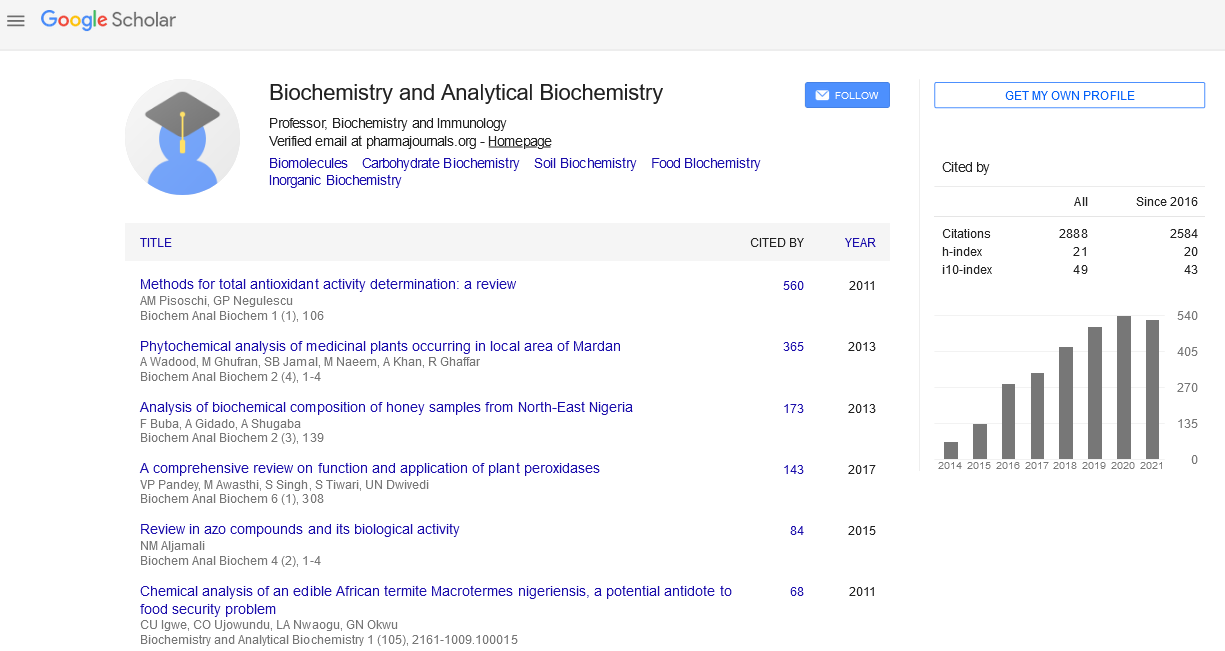Indexed In
- Open J Gate
- Genamics JournalSeek
- ResearchBible
- RefSeek
- Directory of Research Journal Indexing (DRJI)
- Hamdard University
- EBSCO A-Z
- OCLC- WorldCat
- Scholarsteer
- Publons
- MIAR
- Euro Pub
- Google Scholar
Useful Links
Share This Page
Journal Flyer

Open Access Journals
- Agri and Aquaculture
- Biochemistry
- Bioinformatics & Systems Biology
- Business & Management
- Chemistry
- Clinical Sciences
- Engineering
- Food & Nutrition
- General Science
- Genetics & Molecular Biology
- Immunology & Microbiology
- Medical Sciences
- Neuroscience & Psychology
- Nursing & Health Care
- Pharmaceutical Sciences
Glycosylation networking: Role in oral cancer progression and metastasis
Global Congress on Biochemistry, Glycomics & Amino Acids
December 08-09, 2016 San Antonio, USA
Prabhabhai S Patel
The Gujarat Cancer Research Institute, India
Posters & Accepted Abstracts: Biochem Anal Biochem
Abstract:
Oral cancer is a major health hazard in India. The rising trend in younger population is an alarm to have appropriate measures to control the disease. Disappointingly, no considerable improvement in outcome of oral cancer patients is observed in recent decades. Hence there is an urgent need for development of molecular markers for early screening, detection, monitoring disease progression and treatments outcome. Altered glycosylation of cell membrane proteins is critical in carcinogenesis pro. Our laboratory is working on glycosylation (sialylation and fucosylation) alterations in oral cancer since a very long time. We have observed a progressive increase in glycosylation pattern from healthy individuals to patients with oral precancerous conditions (OPC) to oral cancer patients. A significant increase in 192kDa, 170kDa, 116kDa and 44kDa serum glycoproteins was observed in patients with OPC and oral cancer patients as compared to the controls. A 230kDa was present in majority of the tobacco habituates (TH) and an increasing trend was observed from TH controls to TH patients with OPC to TH oral cancer patients. This highlights the association of the 230kDa band in tobacco related progression of oral cancer.1 The results indicated increased serum, salivary and tissue sialylation (TSA, sialidase activity, α-2,3 and α-2,3 and α-2,6 sialoproteins, sialyltranferase) and fucosylation changes (α-L-fucosidase activity, fucoproteins) in patients with OPC and oral cancer. Moreover, the levels of the glycosylation markers were decreased in complete responders (CR) as compared to PT (pretreatment) and were increased in NR as compared to PT levels. A higher expression of ST3GAL1, FUT6 transcripts was observed in malignant tissues as compared to adjacent normal tissues of oral cancer patients and was associated with metastatic and advanced disease. Also, higher expression of FUT3 mRNA was significantly associated with lower overall survival. Our data indicated that methodical understanding of glycosylation alterations in OPC and oral cancer will certainly improve oral cancer screening, diagnostics and management, which is an anticipated remedy to strengthen the fight against oral cancer. Saliva can prove to be an effective non-invasive tool for assessing biomarkers with its easy applicability in clinical set-up.
Biography :
Email: prabhudas_p@hotmail.com


